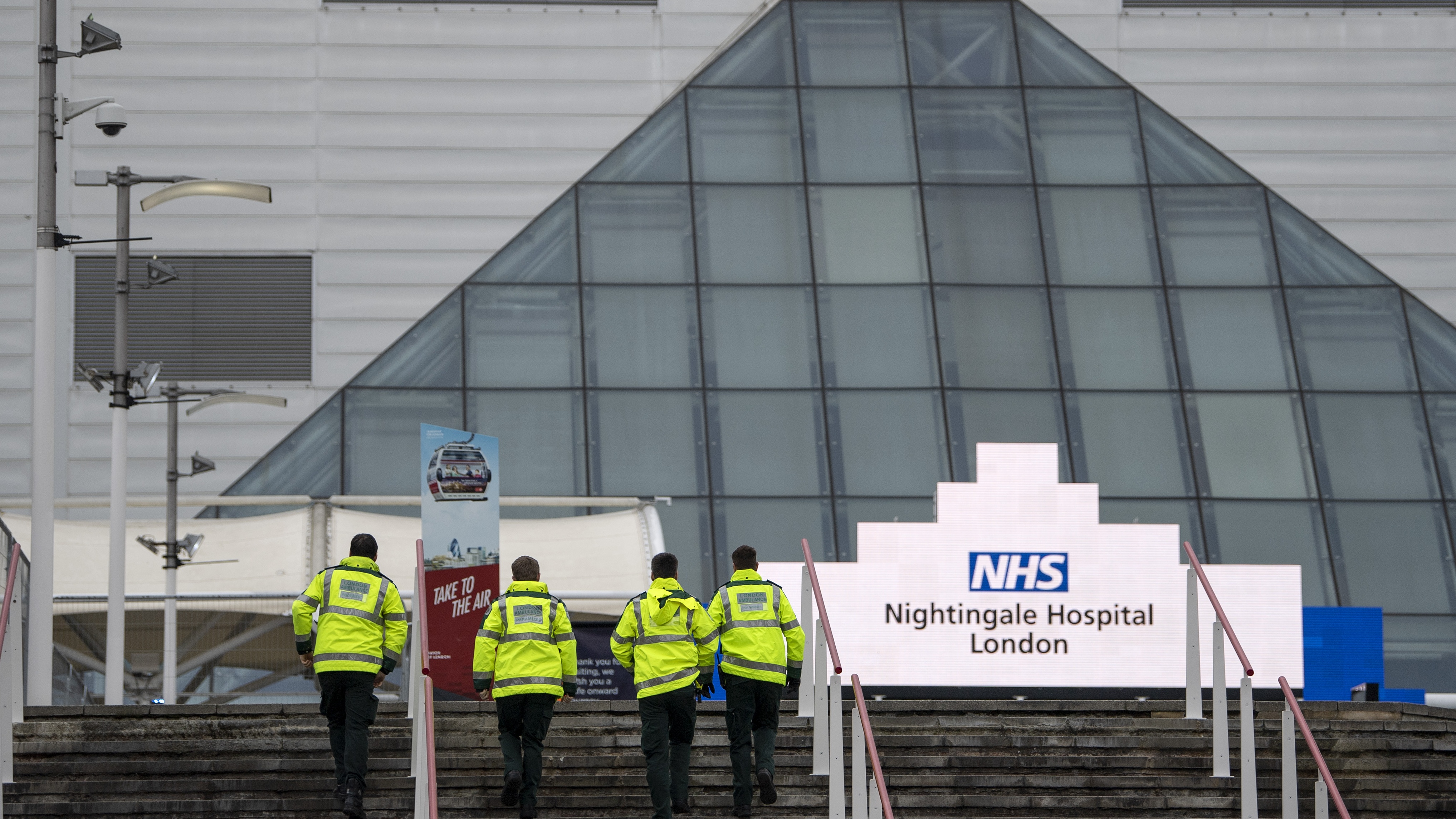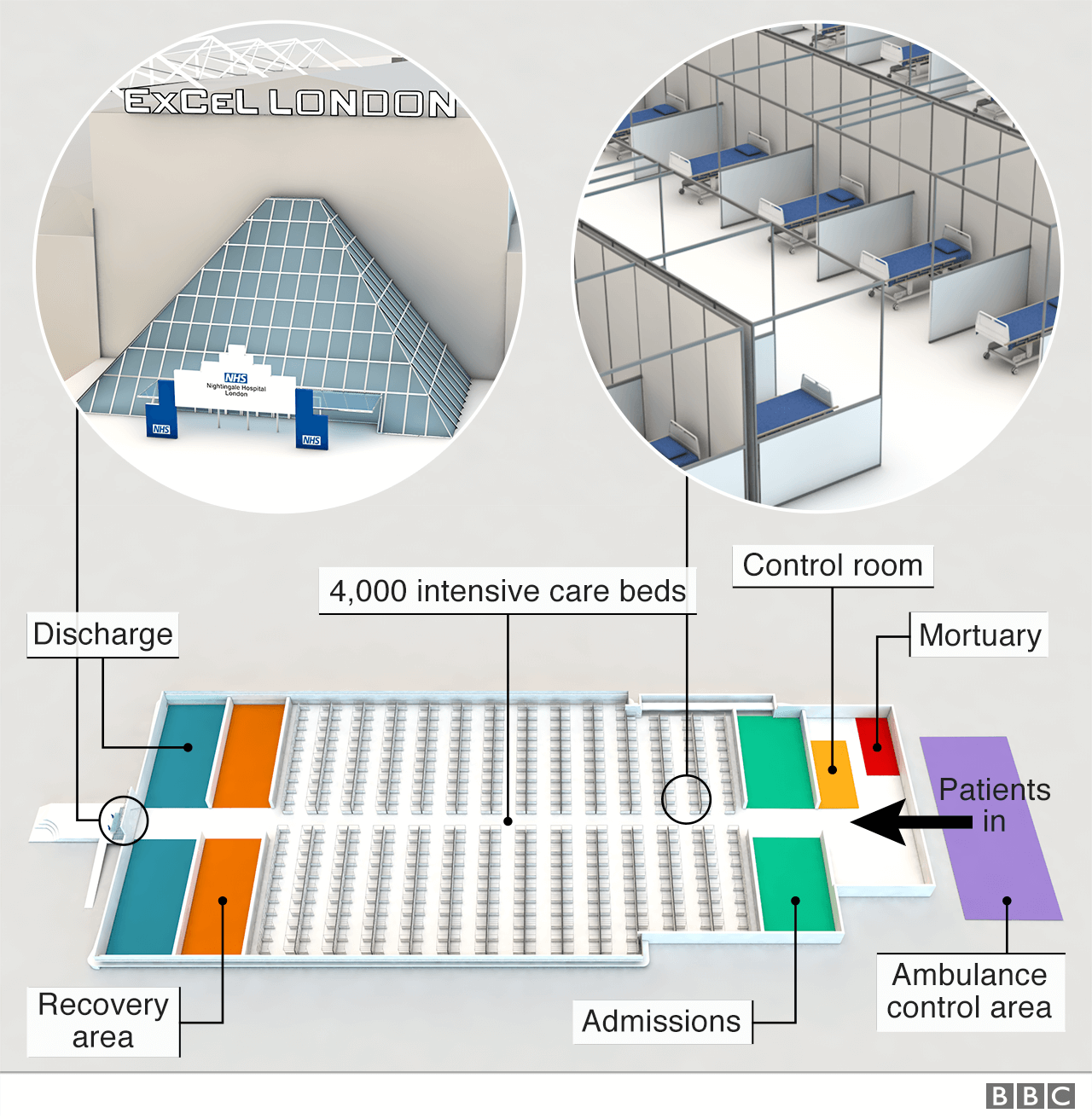Inside NHS Nightingale: London emergency hospital to be put on ‘on standby’
No. 10 says hospital ‘absolutely not’ a waste of money

A free daily email with the biggest news stories of the day – and the best features from TheWeek.com
You are now subscribed
Your newsletter sign-up was successful
The London NHS Nightingale Hospital is to be placed “on standby” due to limited demand for its services, Downing Street has confirmed.
The prime minister’s official spokesperson said that it is “not likely” that patients will need to be admitted in the coming days “while coronavirus in the capital remains under control”.
“That’s obviously a very positive thing,” the spokesperson said - and “absolutely not” a sign that the hospitals were a waste of money.
The Week
Escape your echo chamber. Get the facts behind the news, plus analysis from multiple perspectives.

Sign up for The Week's Free Newsletters
From our morning news briefing to a weekly Good News Newsletter, get the best of The Week delivered directly to your inbox.
From our morning news briefing to a weekly Good News Newsletter, get the best of The Week delivered directly to your inbox.
How were the Nightingale hospitals built?
The Ministry of Defence and the NHS worked together to create the new hospitals from scratch in an effort to accommodate rising numbers of Covid-19 patients.
Images shared by 10 Downing Street show a combination of tradespeople and military personnel – including the Royal Anglian Regiment and Royal Gurkha Rifles – working to adapt the ExCel Centre’s 7,328 square metres of double exhibition halls into the London Nightingale Hospital.

Graphic via BBC News
A free daily email with the biggest news stories of the day – and the best features from TheWeek.com
James Hepburn, principal at BDP, the firm that helped convert the centre, said the size and timescale for its construction were unlike any previous healthcare projects, with architects finalising plans even as construction was beginning.
Conference centres in Birmingham, Manchester, Glasgow, Bristol and Harrogate have been adapted into NHS Nightingale hospitals to help patients across the country.
Belfast City Hospital’s tower block was transformed into Northern Ireland’s 230-bed Nightingale hospital, staffed by a team drawn from across Northern Ireland.
Cardiff’s Principality Stadium was transformed into Dragon’s Heart Hospital, “after a mammoth effort to convert it into a field hospital”, says The Independent.
What were the challenges involved?
According to experts, speaking to Wired, the two primary challenges when launching an emergency medical facility are location and cleanliness.
Martin Bricknell, professor of conflict, health and military medicine at King’s College London and an expert in the design and function of field hospitals, told the magazine: “It’s probably one of the biggest covered spaces in London and therefore as a location that gives you maximum flexibility for how you might use it. It’s probably one of the best in London.”
This is echoed by Eric Pitts, a logistician with Doctors Without Borders, who said: “You’ll have a large open space, and different levels of circulation where you can control the flow of people coming in and out.”
“ExCeL's existing electrical infrastructure has been modified to ensure the power supply can cope with demand - and not cut out. Temporary generators and oxygen tanks, to supply the beds, have also been installed,” says the BBC.
One of the main clinical challenges is hygiene, which Wired notes is a particular challenge with coronavirus as the virus has “been shown to last long on surfaces in the form of droplets”.
Pitts told the magazine: “You need to look at how to properly lay out the patient flow to guarantee infection flow, and how to design the walls and floors so they’re easy to clean. The main challenge in adapting an existing structure is how the existing structure is set out.”
The London Nightingale is led by a team of eight senior staff, drawn from local hospitals and trusts.
At capacity, the hospital would need 16,000 staff to keep it running, including thousands of doctors, nurses and volunteers. So far, it has not come close to capacity.
“The numbers are scary,” chief operating officer Natalie Forrest said. “To run one ward, including all of our ancillary staff, we need 200 members of staff.”
Cabin crew from Easyjet and Virgin Atlantic - many of whom have security clearance and are first aid-trained - were approached to help out with tasks like changing beds and performing other non-clinical tasks in support of doctors and nurses on the wards.
-
 Political cartoons for February 15
Political cartoons for February 15Cartoons Sunday's political cartoons include political ventriloquism, Europe in the middle, and more
-
 The broken water companies failing England and Wales
The broken water companies failing England and WalesExplainer With rising bills, deteriorating river health and a lack of investment, regulators face an uphill battle to stabilise the industry
-
 A thrilling foodie city in northern Japan
A thrilling foodie city in northern JapanThe Week Recommends The food scene here is ‘unspoilt’ and ‘fun’
-
 How corrupt is the UK?
How corrupt is the UK?The Explainer Decline in standards ‘risks becoming a defining feature of our political culture’ as Britain falls to lowest ever score on global index
-
 The high street: Britain’s next political battleground?
The high street: Britain’s next political battleground?In the Spotlight Mass closure of shops and influx of organised crime are fuelling voter anger, and offer an opening for Reform UK
-
 Is a Reform-Tory pact becoming more likely?
Is a Reform-Tory pact becoming more likely?Today’s Big Question Nigel Farage’s party is ahead in the polls but still falls well short of a Commons majority, while Conservatives are still losing MPs to Reform
-
 Taking the low road: why the SNP is still standing strong
Taking the low road: why the SNP is still standing strongTalking Point Party is on track for a fifth consecutive victory in May’s Holyrood election, despite controversies and plummeting support
-
 What difference will the 'historic' UK-Germany treaty make?
What difference will the 'historic' UK-Germany treaty make?Today's Big Question Europe's two biggest economies sign first treaty since WWII, underscoring 'triangle alliance' with France amid growing Russian threat and US distance
-
 Is the G7 still relevant?
Is the G7 still relevant?Talking Point Donald Trump's early departure cast a shadow over this week's meeting of the world's major democracies
-
 Angela Rayner: Labour's next leader?
Angela Rayner: Labour's next leader?Today's Big Question A leaked memo has sparked speculation that the deputy PM is positioning herself as the left-of-centre alternative to Keir Starmer
-
 Is Starmer's plan to send migrants overseas Rwanda 2.0?
Is Starmer's plan to send migrants overseas Rwanda 2.0?Today's Big Question Failed asylum seekers could be removed to Balkan nations under new government plans